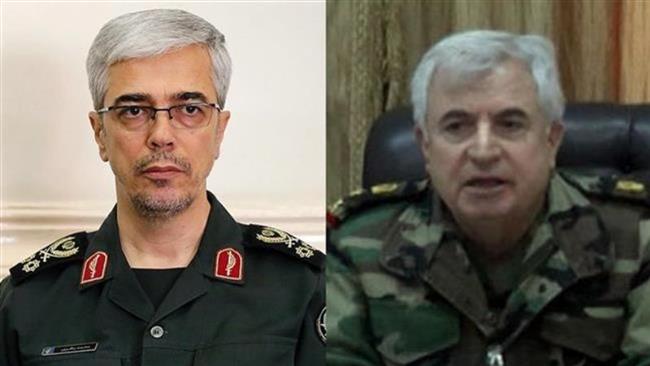UPDATE 2000 GMT: A senior commander of the Islamic Revolutionary Guards Corps says Iran will send more troops to support the Assad regime.
“We will send advisors [to Syria] in every aspect so the resistance front is not breached and we will offer every assistance possible,” the commander of the Guards’ ground Forces, Brigadier General Mohammad Pakpour, said.
Iran has used the umbrella term “advisors” to cover both the input of its troops and of its commanders for Iranian-led Iraqi, Afghan, and Pakistani militia.
Pakpour said, “When you want to offer advisory help to the army of a country in a war, you must be present on the scene and we have advisors in Syria in various areas such as strategic, technical, specialized, tactical and technical [sectors].”
Meanwhile, the head of the Assad regime’s armed forces, Ali Abdullah Ayoub, has met Iranian Defense Minister Hossein Dehqan in Tehran.
Nothing was said about the Iranian military deployment. Instead, Dehqan denounced Saudi Arabia for “sponsoring terrorist groups and for aggravating tensions in the region”.
The Defense Minister also criticized the April 7 US missile strike against an Assad regime airbase as an attempt to boost “terrorist” morale and ensure Israeli security.
Following consultations with Russia, Iran has displayed its military cooperation with the Assad regime in Syria’s 73-month conflict.
The Chief of Staff of Iran’s armed forces, Major General Mohammad Baqeri, met Syrian counterpart General Ali Abdullah Ayoub in Tehran on Monday.
No details of the discussion were given, with Baqeri issuing Tehran’s standard rhetoric that “the Syrian Army and nation have put up brave resistance in the face of crimes by Takfiri terrorists and regional aggression and intervention”.
However, there was an indication that the meeting was spurred by the recent airstrikes of the US and Israel against Assad regime positions, with Iranian media citing the incidents in its framing of Baqeri’s remarks.
On April 7, three days after the Assad regime killed at least 92 people in a chemical attack in northwest Syria, the US launched its first direct missile strikes against the Assad regime. Up to 20 jets, hangars, and buildings were damaged at the Shayrat airbase, from where the nerve-agent attack on the town of Khan Sheikhoun was launched.
Last week, Israeli missiles struck a position near Damascus International Airport. The Israelis have regularly carried out raids seeking to disrupt weapons supplies to the Assad regime’s ally Hezbollah.
Iranian officials — including Baqeri, Defense Minister Hossein Dehqan, and the Secretary of the Supreme National Security Council, Ali Shamkhani — met Russian counterparts in Moscow and Tehran last week to review the situation.
Iranian and Assad regime media said on Sunday that General Ayoub had hailed the “decisive role” of Iranian military support “in the continuation of the Syrians’ resistance and their major victories against terrorists and the Israeli regime”.
TOP PHOTO: Chief of Staff of Iranian Armed Forces, Major General Mohammad Baqeri, and Assad regime counterpart General Ali Abdullah Ayoub

